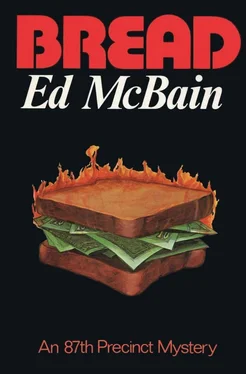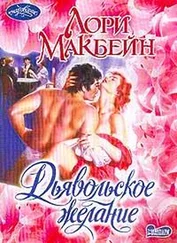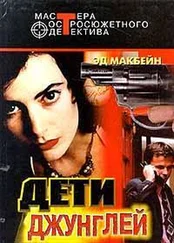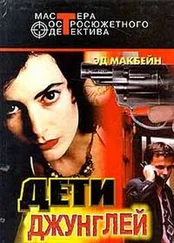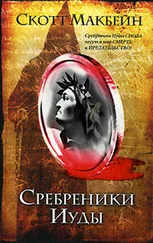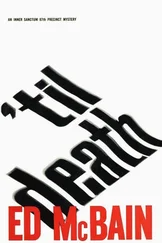“When was this?” Hawes asked.
“Last week sometime.”
“Would you remember when last week?”
“Monday and Tuesday, I think. Yeah, both nights.”
“Do you know her name?”
“Frank didn’t introduce me,” Barbara said. “I’d have told her to get her black ass uptown, where she belongs.”
“And you say some black men were here, too?”
“Yeah. But not at the same time, you understand.”
“When were they here?”
“The last week in July sometime.”
“How many times were they here?”
“Two or three times.”
“How many men did you say?”
“Two of them. Black as the ace of spades. I ran into one of them once, he scared hell out of me.”
“How do you mean?”
“I mean the look of him. Big as a house, and wearing these clothes the coloreds think are so sharp, you know, and with a knife scar running clear down the left-hand side of his face. Drove up in a big white Caddy. I told my husband about him, and he said I’d better stay in the apartment whenever people like that were around. You know those coloreds, nothing they’d like better than to get their hands on a white woman. Especially a blonde,” Barbara said. “Not that my husband’s ever around to stop anybody from doing anything they wanted to do. He’s always running downtown to Bridge Street, picking up hardware and electrical stuff on those sidewalk stalls they got down there. I could get raped here by half a dozen coloreds, he’d never know the difference.”
“Would you know the names of those two men?” Hawes asked.
“Nope. I’m not interested in knowing those kind of people, thank you. It’s awfully hot in here, don’t you think?”
“Supposed to hit ninety-four,” Hawes said, and opened the second dresser drawer.
“Thank God I’ve got air conditioning downstairs,” Barbara said. “Only in the bedroom, but that’s at least something.”
There were half a dozen shirts, a cardigan sweater, three pairs of undershorts, and two T-shirts in the second drawer. A white plastic battery-powered vibrator in the shape of a penis was tucked under the cardigan sweater. Hawes closed the drawer.
“What I’m going to do, soon as we finish here,” Barbara said, “is go downstairs, pour myself a beer, and go hide in the bedroom, where the air conditioner is.”
Hawes opened the bottom drawer of the dresser. It was empty. He closed the drawer and walked to the night table on the left-hand side of the bed.
“I can’t see you anymore,” Barbara said from the living room, “and I like to watch you work.” She suddenly appeared in the doorframe, arms folded across her midsection, cradling her breasts. “That’s better,” she said. She watched as Hawes opened the single drawer in the night table. There was a flashlight in the drawer, a half-empty carton of Camels, a box of wooden kitchen matches, and an address book.
“That husband of mine,” Barbara said, and hesitated.
Hawes opened the address book and quickly scanned it. Frank Reardon had not known too many people. There were perhaps a dozen listings in all, scattered alphabetically throughout the book. One of those was for a man who lived in Diamondback, uptown. His name was Charles Harrod, and his address was 1512 Kruger Street. The listing was significant only in that Diamondback was the city’s largest black ghetto.
“Probably be gone all day,” Barbara said. “My husband. Probably won’t get home till suppertime.”
Hawes put the address book in his pocket with the passbook and walked back through the living room and into the kitchen. Stove, refrigerator, wooden table, cupboard over the sink. He glanced through the cupboard quickly.
“Hot as hell in here,” Barbara said. “I’d open the windows, but I don’t know if I’m allowed to. I mean, with Frank being dead and all.”
“I’m almost finished here,” Hawes said.
“I don’t envy you men in the summertime,” Barbara said, “having to wear suits and ties. I’ve got nothing at all on under this little thing, and I’m still suffocating.”
Hawes closed the cupboard doors, took a cursory look through the drawer in the kitchen table, and then turned to Barbara, who was standing near the refrigerator, watching him. “Well, that’s it,” he said. “Thank you very much.”
“My pleasure,” she said, and walked silently out of the apartment. She waited for him to join her in the hallway, locked the door to Reardon’s apartment, and then started down the steps ahead of Hawes. “Nice cold bottle of beer’ll really hit the spot now,” she said. She glanced over her shoulder, one hand on the banister, and said, almost shyly, “You feel like joining me?”
“I’ve got to get uptown,” Hawes said. “Thanks, anyway.”
“Nice and cool in my bedroom,” Barbara said. “I got a nice air conditioner in there. Come on,” she said, and smiled. “Give yourself a break. Little beer never hurt anybody.”
“Gee, I’d like to,” he said, “but I’ve got a lot of work to do.”
“Well, okay,” she said, and went swiftly down the stairs. On the sidewalk outside, she said, “Anything else you need, you know where to find me.”
“Thanks again,” Hawes said.
She seemed about to say something more. Instead, she nodded briefly, and went into the alley to her apartment, and her air-conditioned bedroom, and her bottle of beer.
The Police Department had advised all residents of the city that special spray attachments for fire hydrants were available at all precinct houses, and that any civic group could obtain them there free of charge, merely by applying. The idea behind this generous distribution of spray attachments was a good one. During the summertime people in the city’s slums opened the hydrants full force in order to provide showers for their sweltering kids. This was good for the kids but bad for the firemen. The open hydrants, you see, drastically reduced the water pressure needed for firefighting. Since the spray attachments needed very little water in order to operate effectively, they seemed like a logical and fair compromise.
But what excitement was there in legally obtaining one of those attachments from the fuzz, when it was just as simple to screw off the nozzle caps with a monkey wrench, open the octagonal brass valve on top of the hydrant, and then tilt the end of a wooden orange crate against the high-pressure stream of water that roared from the open spout, providing a city waterfall of spectacular proportions? If, as a result, a tenement down the street happened to burn down because the firemen didn’t have enough water pressure when they attached their hoses — well, that was one of the prices a slum dweller had to pay for his summertime fun and games. Besides, most slum fires occurred in the dead of winter, caused by cheap, faulty heaters and bad electrical wiring.
The hydrants all up and down Kruger Street were on as Hawes made his way up the block. Black boys and girls in bathing suits splashed in and out of the icy cold cascades, while grownups sat on front stoops and fire escapes, fanning themselves and watching in envy. It was only a quarter to eleven in the morning, but the temperature had already soared to ninety-one degrees, and the air was stifling. 1512 Kruger was a red-brick tenement with a Baptist storefront church on one side of it and a billiard parlor on the other. Three young men wearing blue denim gang jackets were standing outside the green-painted, plate-glass window of the pool hall, watching the younger kids frolicking in the water at the nearest open johnny pump. They glanced at Hawes as he climbed the three steps to the front stoop of the building. A fat black man in a white undershirt sat against the iron railing, fanning himself with a copy of Ebony, holding a bottle of Coca-Cola in which there were two twisted straws. The street gang members knew that Hawes was a cop. So did the fat man in the white undershirt. This was a slum.
Читать дальше
